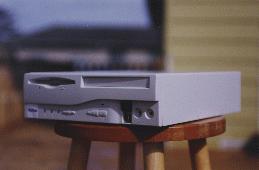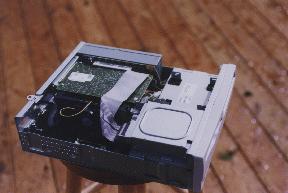
The Helius Satellite Router is a computer system designed to offer an Internet connection with a high download speed to a local computer network.
Manufacturer: Helius
E-Mail: info@helius.com
Price: $2499 US plus dish and installation
Reviewer: Phil Hughes
The Helius Satellite Router is a computer system designed to offer an Internet connection with a high download speed to a local computer network. It is based on a small computer running Caldera OpenLinux that includes a receiver card to connect to a DirecPC dish. You connect the system to your local network via Ethernet. The system then routes outbound traffic to your ISP via a 56K modem. Inbound traffic is received via the satellite disk and routed back to the appropriate host on your local network.

Figure 1.
All your local network does is treat the Helius box as a gateway. It then handles all the interaction to ensure your traffic is routed properly. The result is much like an ADSL connection to the Internet with IP masquerading thrown in, so you can connect a whole network to the Internet with only one IP address.
The system works just the way an experienced Linux hacker would expect. It takes advantage of Linux's built-in masquerading and demand-dial capabilities. You connect the internal modem to a phone line, the receiver card to a DirecPC dish and the 10BaseT Ethernet port to your local network. When a system on your local network requests something from the Internet, the Helius box calls up your ISP, sends out the data and waits to receive data via the dish. When the data is received, the Helius box then routes it back to the requesting system on your local network.
You may be thinking that this system is the same as the one offered by DirecPC—it is not. The standard DirecPC system offers connectivity for a single PC, not a network. That is fine for a single home user, but not for a multiple-system network.
Helius offers installs for under $200, but I elected to do the install myself. After all, why not get the full experience? Helius sent me a dish and I went out and bought a dish installation kit for $60. It included the necessary cables, connectors and even a compass to aim the dish.
I hooked up the dish and did a preliminary aim based on numbers furnished by Helius. I then hooked up a keyboard and monitor to the Helius system. (They don't come with it and are needed only for the dish install.) Armed with a primitive but effective program and an assistant, I got the system up and running. This process took a few minutes and mostly consisted of me yelling out numbers to my assistant while she moved the dish.

Figure 2.
Once up, I connected the system to my network and the phone line and was off and running. I set the gateway addresses on the machines on my network to correspond to the address of the Helius box and started talking to the Internet. That was it. The Helius box dialed my ISP and routed packets without incident.
As far as performance, I had trouble finding sites that would test the capabilities of the system. Helius claims transfer rates of up to three megabits per second. I saw rates of 37KB per second doing an FTP access to SSC's FTP server and a 31KB per second transfer rate to the same server while simultaneously saving Usenet news. With my usual transfer rates at 4KB per second on my 56K modem, I am rather pleased with these new rates.
While this system is not the answer for everyone, it certainly has an audience. If you are a small company or school that needs an Internet connection with high download bandwidth, this is an ideal system. In an area where ADSL is available, you need to evaluate the pros and cons of DSL versus this wireless technology. If DSL is not available in your area, this system seems like an easy win.
Handling tens of users is easily attained with a minimal setup and monthly cost.
The system costs $2499 for up to 30 concurrent users. This includes 90 days of support/maintenance. Extended support is available in the US for $299/year. Add to this the cost of the dish, about $300, and if you elect to, about $180 for installation.
In addition to the cost of the system, you need to pay for monthly service from DirecPC and your ISP. DirecPC charges $109.99/month for the first 200 hours of connectivity and $.99 for each additional hour. ISP costs vary. What I see in Seattle is around $20/month for the first 100 hours, $.50/hour after that. Thus, for under $200/month you can get 200 hours of on-line time with a fast download transfer rate.
This question boils down to, “do you need a fast download system for a network?” If so, the Helius Satellite Router is an ideal solution. It is capable of talking to a UNIX/Linux-, Windows- or Macintosh-based network, easy to install and performs well at a reasonable cost.